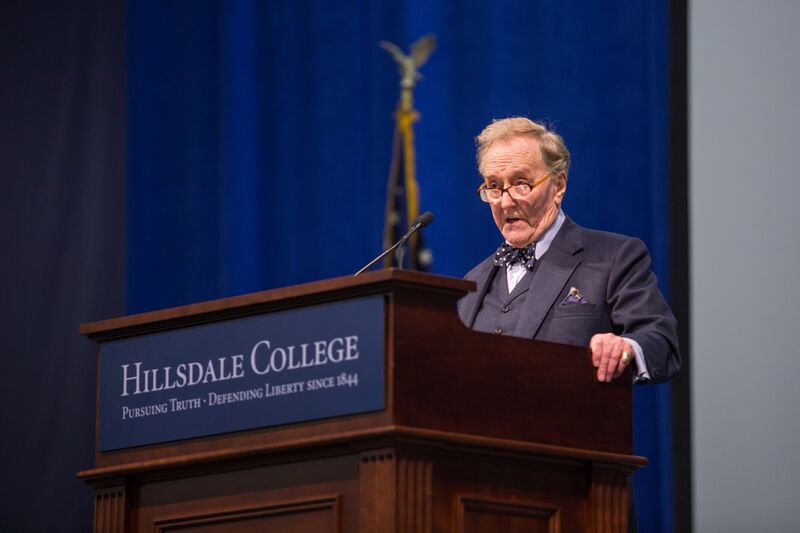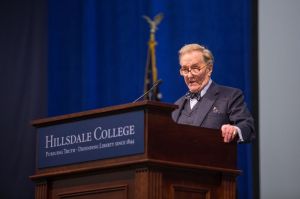Robert Hardy is one of England’s most successful character actors. He has played Sir Winston Churchill many times in television, film, and theater productions. Best known for his role as Siegfried Farnon in BBC’s “All Creatures Great and Small” series, he also played Cornelius Fudge in the “Harry Potter” films among many others. Hardy spoke at this week’s Center for Constructive Alternatives seminar.
Every generation has their defining moment — for my generation it’s the attacks on September 11, 2001 in New York. Do you have any specific recollections of the day Adolf Hitler invaded Poland?
Yes. Vivid. I was born in 1925. I remember every detail of that whole business. I suppose it’s really itemized in the broadcast that Neville Chamberlain, who was our prime minister, made on the radio. He said, “We are at war with Germany. We have received no response to my cable saying that if by 11 o’clock we had not heard from Mr. Hitler that it would be a state of war. We have heard no word from the leader of Germany, the leader of the Nazis, and therefore we are at a state of war.” And then he went on to my shock to say, “You can imagine what a great disappointment this personally is to me.” And I thought, — I was not very advanced, but enough to think very quickly — “That’s a mean personal response to an epic situation, which may see Britain attacked, Britain destroyed, America attacked — who could foresee what this mania was going to do?” I remember thinking that at the time. Quite soon afterwards, placards began appearing all over London — nobody to this day knows who financed it — great big, simply printed placards saying, “What price, Winston?” “How about Churchill?” — things like that. “Now for Churchill.” Things like that printed up on giant street placards. So all of that time, one was at some kind of mixture of excitement and dread. Excitement because I was at the right age to be excited, obviously. War: thrill. Airplanes. I was trained as a pilot.
When you came back from training, what was it like to transition back to wartime England?
Well it wasn’t over yet when we got back. When we got back, you dropped the bombs. So our choice, of the group that trained at that date, was either to sign on to train for five years and be sent out to the Far East, or to hang around and be offered another job in the Royal Air Force. And I wasn’t going to do that — no thank you. I was in a hurry, you know. So one hung around mostly in London. So I spent most of my time — and all of my money — going to the theaters. I went every night.
I understand you were at Oxford at the same time as C.S. Lewis?
He was my tutor. It was wonderful because I had formed an opinion
of an El Grecco face of great severity and terrifying logic. And when I arrived to greet him for the first time at Magdalen College, I turned up, and they told me at the college lodge exactly how to get to Lewis’ apartment. I think he was Professor Lewis, but to me it was “Mr.” or nothing. So I went through the wonderful cloisters, and then you go through a dark tunnel, and suddenly the world was alive with light. There was a great stretch of two or three acres of mown, lawn grass.
Coming across it was somebody who was looking like a farmer. I thought he was a gardener. Then I noticed he’d got a tie on. So I thought he must be head gardener. So as we passed, I said, “Good morning,” and he said, “Good morning,” and passed me. The moment he was passed, the voice behind me said, “You must be Hardy.” I said, “Yes, I am.” And he said, “I’m Lewis.” That was Lewis. And we always got on famously and happily together and were able to argue — which is half the battle of tutor and undergraduate, isn’t it?
Then I learnt that my Anglo Saxon and Middle English tutor was going to be J.R.R. Tolkien. And we got on famously. I had the greatest admiration for him. He was such fun, and so brilliant — I mean, a sort of magician.
We did one tutorial, and then he said, “Next Wednesday, we’ll meet at the Bird and Baby” — which is a pub called the Eagle and Child. And he said, “We’ll sit at the table at the window, and when you arrive, you’ll find I’ve set you up a pint each, and then we’ll carry out a little experiment.” So this is what happened: He sat with his back to the window and we were arranged in front of him like a horseshoe. Then he said, “I want you all to change places, tell me when you’re seated and ready, so long as I don’t know who is where.” And when we were ready, he said, “Starting at the left, speak and just go on talking until I say, ‘Thank you.’”
So we went ‘round the six. And at the end of that he said, “Right, now you were No. 1. Now let me tell you where you come from.” And he analyzed what exactly made our speech sound like it did.
And he went ‘round the six, and six jaws dropped. And when he got to me, he said, “Ah, interesting. A bit of border Welsh lilith there, but sadly overlayed by smart London.” And I said, “You’re absolutely on target in every degree.”
And he said at the end, “You’ll wonder, perhaps, what all that was about. What that was about was to breed faith in you, to make you understand that I know how Anglo Saxons sound. I know how Chaucer sounds. So have faith. Because I’ve demonstrated that I understand how sound gives me knowledge.”
And we were all absolutely aghast. But by the end of our first term with him, one could speak Anglo Saxon and sound Anglo Saxon.


